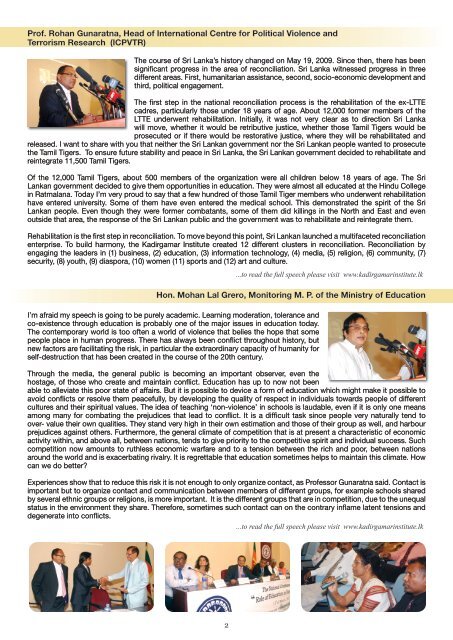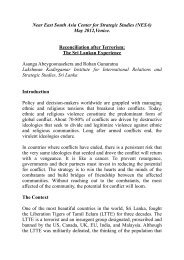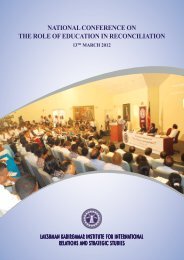Kadirgamar Quarterly - Lakshman Kadirgamar Institute of ...
Kadirgamar Quarterly - Lakshman Kadirgamar Institute of ...
Kadirgamar Quarterly - Lakshman Kadirgamar Institute of ...
You also want an ePaper? Increase the reach of your titles
YUMPU automatically turns print PDFs into web optimized ePapers that Google loves.
Pr<strong>of</strong>. Rohan Gunaratna, Head <strong>of</strong> International Centre for Political Violence and<br />
Terrorism Research (ICPVTR)<br />
The course <strong>of</strong> Sri Lanka’s history changed on May 19, 2009. Since then, there has been<br />
significant progress in the area <strong>of</strong> reconciliation. Sri Lanka witnessed progress in three<br />
different areas. First, humanitarian assistance, second, socio-economic development and<br />
third, political engagement.<br />
The first step in the national reconciliation process is the rehabilitation <strong>of</strong> the ex-LTTE<br />
cadres, particularly those under 18 years <strong>of</strong> age. About 12,000 former members <strong>of</strong> the<br />
LTTE underwent rehabilitation. Initially, it was not very clear as to direction Sri Lanka<br />
will move, whether it would be retributive justice, whether those Tamil Tigers would be<br />
prosecuted or if there would be restorative justice, where they will be rehabilitated and<br />
released. I want to share with you that neither the Sri Lankan government nor the Sri Lankan people wanted to prosecute<br />
the Tamil Tigers. To ensure future stability and peace in Sri Lanka, the Sri Lankan government decided to rehabilitate and<br />
reintegrate 11,500 Tamil Tigers.<br />
Of the 12,000 Tamil Tigers, about 500 members <strong>of</strong> the organization were all children below 18 years <strong>of</strong> age. The Sri<br />
Lankan government decided to give them opportunities in education. They were almost all educated at the Hindu College<br />
in Ratmalana. Today I’m very proud to say that a few hundred <strong>of</strong> those Tamil Tiger members who underwent rehabilitation<br />
have entered university. Some <strong>of</strong> them have even entered the medical school. This demonstrated the spirit <strong>of</strong> the Sri<br />
Lankan people. Even though they were former combatants, some <strong>of</strong> them did killings in the North and East and even<br />
outside that area, the response <strong>of</strong> the Sri Lankan public and the government was to rehabilitate and reintegrate them.<br />
Rehabilitation is the first step in reconciliation. To move beyond this point, Sri Lankan launched a multifaceted reconciliation<br />
enterprise. To build harmony, the <strong>Kadirgamar</strong> <strong>Institute</strong> created 12 different clusters in reconciliation. Reconciliation by<br />
engaging the leaders in (1) business, (2) education, (3) information technology, (4) media, (5) religion, (6) community, (7)<br />
security, (8) youth, (9) diaspora, (10) women (11) sports and (12) art and culture.<br />
Hon. Mohan Lal Grero, Monitoring M. P. <strong>of</strong> the Ministry <strong>of</strong> Education<br />
I’m afraid my speech is going to be purely academic. Learning moderation, tolerance and<br />
co-existence through education is probably one <strong>of</strong> the major issues in education today.<br />
The contemporary world is too <strong>of</strong>ten a world <strong>of</strong> violence that belies the hope that some<br />
people place in human progress. There has always been conflict throughout history, but<br />
new factors are facilitating the risk, in particular the extraordinary capacity <strong>of</strong> humanity for<br />
self-destruction that has been created in the course <strong>of</strong> the 20th century.<br />
2<br />
...to read the full speech please visit www.kadirgamarinstitute.lk<br />
Through the media, the general public is becoming an important observer, even the<br />
hostage, <strong>of</strong> those who create and maintain conflict. Education has up to now not been<br />
able to alleviate this poor state <strong>of</strong> affairs. But it is possible to device a form <strong>of</strong> education which might make it possible to<br />
avoid conflicts or resolve them peacefully, by developing the quality <strong>of</strong> respect in individuals towards people <strong>of</strong> different<br />
cultures and their spiritual values. The idea <strong>of</strong> teaching ‘non-violence’ in schools is laudable, even if it is only one means<br />
among many for combating the prejudices that lead to conflict. It is a difficult task since people very naturally tend to<br />
over- value their own qualities. They stand very high in their own estimation and those <strong>of</strong> their group as well, and harbour<br />
prejudices against others. Furthermore, the general climate <strong>of</strong> competition that is at present a characteristic <strong>of</strong> economic<br />
activity within, and above all, between nations, tends to give priority to the competitive spirit and individual success. Such<br />
competition now amounts to ruthless economic warfare and to a tension between the rich and poor, between nations<br />
around the world and is exacerbating rivalry. It is regrettable that education sometimes helps to maintain this climate. How<br />
can we do better?<br />
Experiences show that to reduce this risk it is not enough to only organize contact, as Pr<strong>of</strong>essor Gunaratna said. Contact is<br />
important but to organize contact and communication between members <strong>of</strong> different groups, for example schools shared<br />
by several ethnic groups or religions, is more important. It is the different groups that are in competition, due to the unequal<br />
status in the environment they share. Therefore, sometimes such contact can on the contrary inflame latent tensions and<br />
degenerate into conflicts.<br />
...to read the full speech please visit www.kadirgamarinstitute.lk




